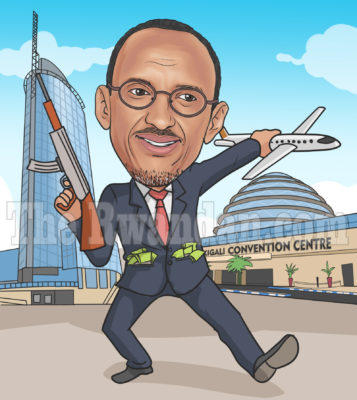By The Rwandan Economist
As the IMF’s end-of-mission note on its website shows, Rwanda’s debt could rise from 71% in 2020 to just over 80% by 2022. It is important to note that these forecasts are made on the basis of information provided by the Rwandan authorities whose reputation as a tekiniker (manipulating data to show a good image of the country) is no longer to be made and before the postponement of the 2021 Commonwealth CHOGM Summit, whose impact on the Rwandan economy is certain.
The IMF’s note
IMF staff have reached agreement on the policies needed to complete the fourth review under the Policy Coordination Instrument (PKI).
Growth is expected to rebound to 5.1% in 2021, following a 3.4% contraction last year due to the COVID-19 pandemic. This rebound comes as vaccines are deployed and the government continues to support the economy and the population through the economic recovery plan.
To mitigate the risks to the outlook exacerbated by the COVID-19 pandemic, fiscal policy will need to strike a balance between debt sustainability and strengthening recovery and growth. Implementation of structural reforms needs to be accelerated, including by strengthening fiscal risk management to promote inclusive growth and mitigate debt risks.
Washington, DC: An International Monetary Fund (IMF) mission, led by Haimanot Teferra, held virtual meetings with Rwandan authorities from March 22 to May 6, 2021, to discuss the fourth review of Rwanda’s Policy Coordination Instrument (ICP) program. At the end of the mission, Ms. Teferra issued the following statement:
Paul Kagame is just another “dictator”, a criminal, genocidal (more than 6 million of the dead in Rwanda and drc), who managed to enrich himself and his RPF band while impoverishing the Rwandan population, the country and the eastern DRC.
The IMF mission had productive discussions with the authorities and reached a service-level agreement on the policies needed to complete the fourth IDP review. The review is subject to approval by the IMF Executive Board. The Council’s review is tentatively scheduled for the end of June 2021.
Rwanda continues to struggle with the consequences of the COVID -19 pandemic. Economic activity contracted by 3.4% in 2020 while a second wave of infections resulted in a three-week lockdown in Kigali in early 2021, a gradual lifting of restrictions is currently underway. Growth is expected to rebound to 5.1% in 2021, thanks to the national immunization campaign targeting 60% of the population by the end of June 2022 and continued government support for hard-hit businesses and vulnerable households. However, the risks of declining growth remain significant due to uncertainties surrounding the duration and impact of the pandemic, as well as the availability of vaccines.
The budget deficit in the first half of fiscal year 20/21 was larger than expected due to the accelerated implementation of school construction and the timing of disbursements of budget support, despite the outperformance of revenues. Overall inflation reached 2% year-on-year in March, mainly due to lower food prices, and is expected to remain subdued in the coming quarters. The banking system remains stable, liquid and well capitalized but the pandemic has contributed to the accumulation of credit risk. The current account deficit widened in 2020, while gross international reserves amounted to 6 months of forecast imports.
The dream sold to Westerners vs. reality
The new program sold to the IMF aims to “minimize the scars of the loss of human capital”, we should first think about stopping the bleeding.
The programme’s performance was solid, with all quantitative targets by the end of December 2020 being met and all but one of the reform targets being met. However, in the future, the risks to the fiscal and debt outlook have increased. The budget deficit for the current fiscal year and the next two is expected to widen further due to the need to increase spending to, among other things, cope with the deployment of the COVID-19 vaccine, hire new teachers to minimize the scars of loss of human capital, and provide support to the private sector and state-owned enterprises. As a result, public and government – guaranteed debt is expected to increase to just over 80% of GDP by 2022, up from 71.3% at the end of 2020. While Rwanda’s risk of over-indebtedness is expected to remain moderate, risks have increased and shock absorbers to cushion the impact of external shocks have decreased.
Given the deteriorating fiscal and debt outlook, uncertainty about the pace of recovery and the frequency of macroeconomic shocks in Rwanda, it is essential to strike a balance between supporting the economic recovery and maintaining fiscal responsibility. Political action to support the recovery must be complemented by growth-friendly fiscal consolidation once the crisis subsides, supported by credible revenue and spending measures to bring debt back to the anchor of 65% of GDP within a reasonable time frame. In order to have sufficient time to define these measures, the authorities requested a one-year extension of the ICH programme. In addition, vulnerabilities in the financial sector should be contained through increased credit risk monitoring and prudent loan classification and provisioning.
Maintaining the momentum for inclusive recovery and achieving the Sustainable Development Goals will also benefit from accelerated efforts to mitigate emerging risks and advance key reforms under the ICH agenda. These include measures to strengthen domestic revenue mobilization as part of Rwanda’s medium-term revenue strategy, streamline spending, ensure the quality of public investments and strengthen the management of fiscal risks, including those related to state-owned enterprises, public-private partnerships and government loan guarantees. Measures to deepen financial markets, support the expansion of digital payments and strengthen financial inclusion should help accelerate private sector development and foster strong and inclusive growth over the medium term.
The mission is grateful for the close cooperation of the authorities.































































